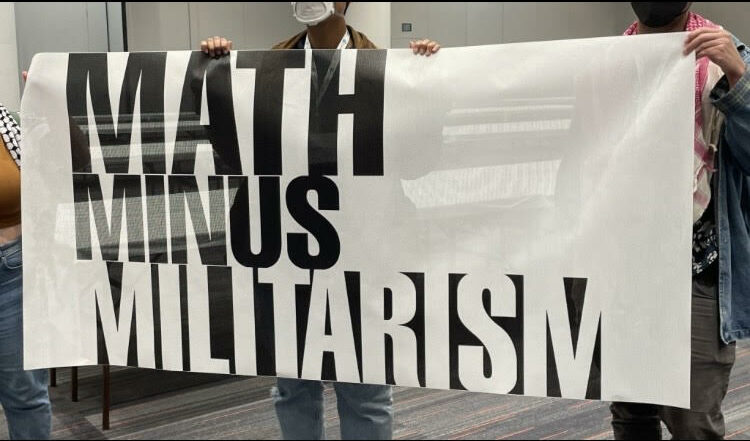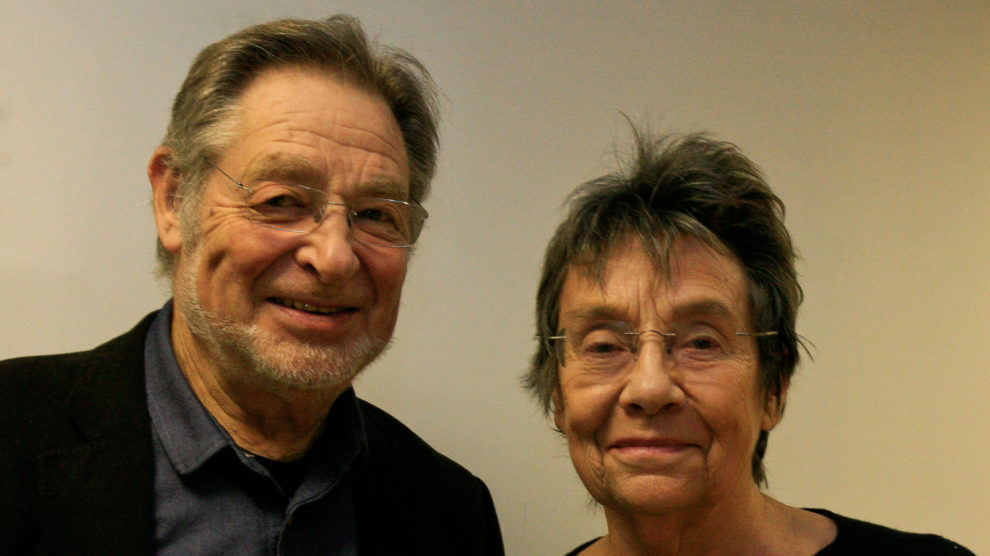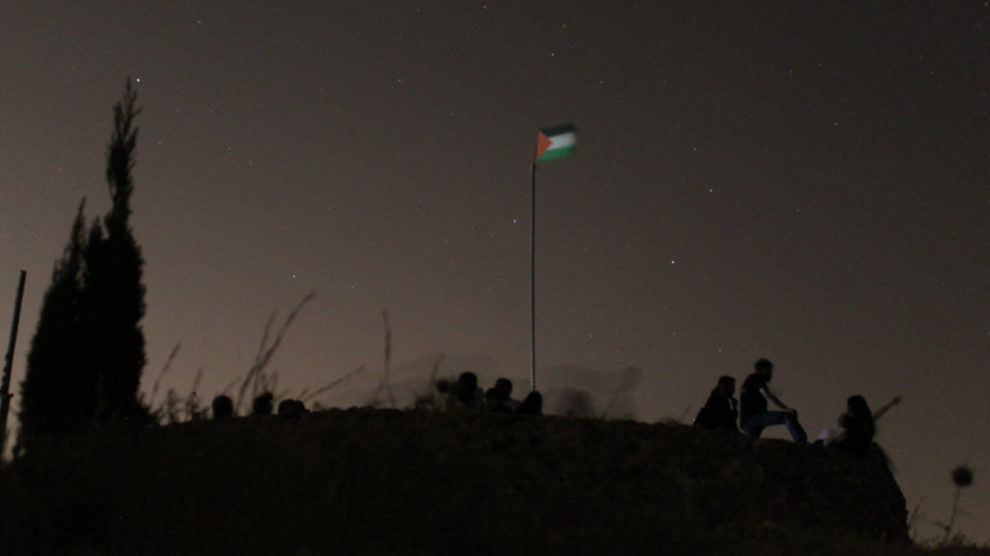Towards an Insurgent Science for Palestine
By Tarik Aougab

In the wake of one of the most historic student movements in decades, the call for divestment from Israeli institutions complicit in the maintenance of apartheid has never been louder. The Boycott, Divestment, and Sanctions (BDS) movement—inspired by a similar worldwide movement against Apartheid South Africa and spearheaded by Palestinian organizers—has for the last twenty years been at the forefront of the charge to divest from Israeli institutions.1 In 2004, a vast collection of Palestinian unions, professional societies, human rights groups, and community organizers came together to endorse a broad boycott movement, targeting Israeli state institutions and global corporations that profit from settler-colonialism in Palestine.
In the Global North, most of the news surrounding the BDS movement makes it out to be very radical and fringe.2 Zionist politicians often take pains to mount a “guilty by association” charge by implying connections between BDS and other Palestinian resistance groups that have already been tarred in the Western media as terroristic, militant, or insurgent. This applies equally to the Academic and Cultural Boycott, a component of BDS that asks academics, researchers, artists, and performers not to collaborate with cultural institutions—for example, universities—that sustain the apartheid Zionist regime.3 However, when placed within the scope of Palestinian organizing, BDS is mainstream.4 Amongst the political actors struggling for liberation both within Palestine and in the diaspora, BDS is the bare minimum.
Insurgent Science
What would it look like for us, as scientists, to engage in a truly insurgent scientific practice for Palestine? What would this entail? How can we position ourselves such that BDS becomes to us what it is to Palestinians engaged in their own fight for liberation; that is to say, the bare minimum? I will outline several steps that scientists can begin to take now in their own networks. As part of the Just Mathematics Collective, I draw from my experience on a campaign geared towards a mass academic boycott: I encourage every scientist reading to sign on and join us.
Step 1: Commit Publicly to Scientific BDS and Become an Organizer in Your Own Networks
I’ve spoken with many scientists about joining our campaign who tell me that they have been quietly adhering to the call for academic boycott for years, for example not attending academic events at Israeli institutions, not submitting research papers to journals published by Israeli universities, and not writing letters of recommendation for employment at such universities. These scientists often ask what is gained by publicly announcing their support for boycott. The answer is simple: vocalizing support for academic boycott plays a normalizing role. Our colleagues need to understand that the tide is turning; we should be aiming for an academic environment in which the politically risky move is to cross the BDS picket line, and we can only arrive there by publicizing our participation in, and support of, this movement.
The goal of an organizer in science should be to make our colleagues feel empowered to join us. This is something we think carefully about in the Just Mathematics Collective; for example, our BDS campaign is designed to minimize the barrier of entry for other scientists. We do not publicize the names of our signatories and instead only keep a running tally of the number of participating scientists; after all, the logic of boycott as a political strategy relies on collective strength. We organize in this way in order to protect against a common pitfall: what begins as a handful of enthusiastic people being vocal about their support for a particular cause can sometimes morph into a cult of personality. In an effort to inspire and bring in more people, organizers rely on their own personal charisma and political courage. In the academic context, this might look like intentionally subverting professional norms by mentioning BDS in talks and organizing panels on its merits at conferences which traditionally focus exclusively on basic science. While I encourage scientists to do all of these things, they can backfire if we are not also making clear to would-be supporters that in order to endorse BDS, they don’t have to do everything we do.
It’s worthwhile mentioning some basic talking points that have worked well in discussing BDS with other scientists. Crucially, we should be able to communicate its basic principles in ways that undercut the most common bad-faith and diversionary critiques of it, namely that it “singles out” the Zionist entity. Consider the common Zionist refrain that BDS must be motivated by antisemitism, because otherwise people would also be calling for a boycott of, for example, Chinese institutions given their government’s role in the Uyghur genocide.5 It can be useful to hone in on several criteria met by the genocide in Palestine and the role Israeli universities play in it—and not met by circumstances in other countries even if those governments are carrying out terrible crimes that justify boycott, both ethically and strategically.
First, there is the complicity of Israeli universities in the ongoing Nakba and genocide of Palestinians.6 The overlap between Israeli weapons manufacturers and Israeli universities is so pronounced, one does it a disservice by referring to it as merely a revolving door.7 A vast number of employees at Elbit and Rafael—the two largest weapons firms in Israel—are graduates of the Technion, Israel’s leading technical university.8 The Technion granted one of Elbit’s most esteemed presidents, Yossi Ackermann, an honorary doctorate, and it hosts official and lucrative partnerships with Elbit and Rafael.9 Moreover, Israel’s scientific institutions pride themselves on conducting much of the basic research upon which the surveillance and weapons technology (eventually developed and marketed by private Israeli firms) is based.10
Second, there is the potential for scientists to make a concrete impact. A political movement has the responsibility to demonstrate that its tactics have the capacity to inspire material change. Those who question the efficacy of academic boycott may argue that the academic boycott of South Africa was largely symbolic in nature.11 On the other hand, South Africa was not known the world over for its academic institutions. The South African state did not hedge its international reputation on the prestige of its universities. Its economy was largely agrarian; conversely, Israel’s economy is heavily dependent on the export of high-tech goods.12 Supporters of the Israeli state bill it as a technological hub—the so-called “start-up nation”—fueled by the quality of its academic institutions.13 Its overall economic health is heavily reliant on its capacity to attract scientific talent to study at its universities and to produce new tech in its laboratories. For this reason, a broad and international scientific boycott effort has the capacity to put pressure on the Israeli state in a way that was simply not possible for academic scientists in the case of Apartheid South Africa.
Third, there is the importance of genuine solidarity with the oppressed. Any movement that claims to exist for the benefit of a certain group of people should be doing its absolute best to take direction from those very people. Of course in practice, this criterion can easily fall prey to the forces of tokenization; just because there are Palestinians who think the international scientific community should be doing one thing or another of course does not preclude the existence of other Palestinians who think the opposite. Having said that, it becomes meaningful when an unprecedentedly large coalition of unions, professional societies, human rights organizations, and resistance groups amongst the oppressed come together to endorse a specific movement, and this is indeed the case for the academic boycott of Israel.
We can now revisit the example of the Uyghur genocide with our criteria in hand. In that instance, there is no decades-long call for boycott, lead and supported by an overwhelmingly broad cross-section of Uyghur civil society, nor has a scientific boycott in that specific context been argued for (again, for decades and by many political organizers, researchers, and every day people) from a strategic standpoint.
Step 2: Connect with Community Organizers Fighting for Palestine in Other Spheres
One of the most heartening aspects of the student intifada is its insistence on a commitment to abolitionist principles; it is not enough to simply divest from companies complicit in the maintenance of apartheid in Palestine—we must divest from weapons manufacturers and policing organizations whether or not their connections to the Palestinian genocide are explicitly spelled out in some institutional investment spreadsheet. The student movement understands the interconnectedness between, for example, the fight for Palestinian liberation, and the fight against Cop City in Atlanta. When we take a page from their book and adopt a wider lens, we will notice many more opportunities for important collaboration.
For example, the Just Mathematics Collective has a campaign aimed at severing ties between professional mathematics and the National Security Agency (NSA). As part of this campaign, members organized direct actions against NSA recruitment events at large mathematics conferences.14 The first of these actions took place in Boston, in January of 2023. While some of us had experience putting on direct actions, many of us did not. Moreover, most of us were unfamiliar with Boston and had no clue what sort of police response to expect. Luckily, we were put in touch with the Muslim Justice League, a community group in Boston that for years has fought tirelessly for Black and Brown Bostonians (and in the last several months, has been incredibly active in the Boston-area movement against the Palestinian genocide). Organizers with the League were more than happy to collaborate with us, because they understood the importance of fighting against the NSA, given the ways it polices, surveils, and criminalizes Muslim communities.15 They showed us the ropes and helped us organize an action on their turf, and conversely, we facilitated their access to a space in which the NSA was present and totally unprepared to be challenged.
Insurgent science demands this sort of mutually beneficial collaboration. As established in the previous section, the extent to which big tech has become a target of the movement for a free Palestine, means that scientists have important resources to offer our comrades in organizing spaces. In our case, the Muslim Justice League didn’t need a lecture on how mathematics is put to use by the NSA in cryptographic applications; they just needed our help in gaining access to the conference (and also navigating some of the arcane social norms prevalent at such events). Similarly, we might happen to have connections within our own university settings, or in tech firms complicit in genocide, to which community organizers would love to have access. We can only learn how to contribute to the struggle for Palestinian liberation by participating in it.
Step 3: Put Your Science to Work for Palestine
Our next task is to collectively imagine ways in which our scholarly work can facilitate the fight for justice in Palestine. The insurgent scientist should in particular think about how to connect their work to the political tactics that live beyond the modes of engagement that are merely conventional by Palestinian standards, such as BDS.
For example, the Mapping Project is an interactive web tool designed by an anonymous collective which allows the user to highlight various relationships between organizations in the Boston area that support Zionism, medical apartheid, police brutality, and housing injustice. The purpose of the project is to illustrate how interconnected these forces are, and to perhaps provide organizers with a tool for discerning patterns in the web of Boston-area collaborations between cops, business owners, hedge fund managers, and universities. Predictably, the project was maligned by many in the mainstream media in the ways that Palestine solidarity work often is: by accusing it of dangerous antisemitism, and even collaboration with other governments hostile to US interests.16 In reality, organizations were included in the dataset (or network analysis) if they expressed material support for Zionism, but cheerleaders for Israel have a vested interest in conflating anti-Zionism with antisemitism, and in this instance, they succeeded in passing on that conflation to those who reported on the project.
The sort of data collected by the Mapping Project is perfect for elementary network analysis. Using mathematical tools that are taught in a standard advanced linear algebra course, a mathematician can study the combinatorics of a network and quantify, using so-called centrality measures, which nodes are most “centrally positioned” within the network. One can for example imagine a community organizing group focused on Palestinian liberation who want to determine a target for a divestment campaign. They could in theory use these sorts of tools to determine which entity in Boston, if removed from the network of Zionist-supporting institutions, would damage the overall health of the network most dramatically.
This is precisely the sort of application explored in an essay written by two of our members, using the Mapping Project’s interactive tool.17 In it, they determine the relative centrality of Harvard University and they discuss several ways that student divestment organizers might use this information to their advantage, for example by short-circuiting the ways that university administrations try to sap the energy out of divestment campaigns by attempting to minimize the importance of the institution’s investments.18
It is important to keep in mind the possible consequences of practicing insurgent science. For instance, Israel passed a law in 2017 that gives the state the right to deny entry (both to Palestine and Israel) to anyone known to have publicly supported BDS. This will ostensibly make it harder for the insurgent scientist to participate in collaborative scientific programming taking place in Palestine. There is also the consideration of respectability; as scientists, we have a certain cultural cachet, and we forfeit some of this academic prestige when we choose to engage with more radical tactics. It is not always clear to me how to translate this cache into material impact without immediately losing it, but there are scientists who swear by its importance when it comes to enacting change.
Navigating the advantages and disadvantages of maintaining respectability is not a challenge faced uniquely by scientists. We can even see this tension playing out after the Boycott National Committee, the organizing team largely responsible for setting the agenda of the BDS movement, put out a statement in which they discouraged international support for Palestinian militant resistance.19 They recently released a second statement in which they walk this back and clarify their support for militant resistance. The Popular Front for the Liberation of Palestine released a statement in response, reiterating its general support for BDS.20 The managing of respectability relates also to the tendency in mainstream organizing for Palestine of relying on the image of Palestinians as perpetual victims: the logic behind this cynical flattening of Palestinian existence is that acknowledging the reality of Palestinians fighting back—as oppressed and colonized peoples have always done throughout history—might dilute international sympathy for the cause.21 Of course the problem with this framing is that those who benefit most from the continual destruction of Palestine are many of the same people with the power to determine what is respectable and what isn’t, and therefore the actions that remain within the bounds of respectability are often toothless or ineffective by design.
In any case, I am not expecting every scientist will become insurgent for Palestine; indeed, the lion’s share of scientists will not be willing to take on roles that require them to relinquish respectability. Thus, any role in the movement that depends on the maintenance of respectability is far more likely to be reliably filled. It is insurgence that we lack. Let us build a scientific community that collectively honors the many revolutionary Palestinian intellectuals– such as Ghassan Kanafani, Leila Khaled, and Bassel Al Araj—who understood the importance of embracing insurgence in their pursuit of truth and justice. And in the process, let us cultivate a scientific practice that embraces the full spectrum of Palestinian existence.
Meet the contributor:
Tarik Aougab: Tarik is a mathematician studying geometry and topology. He currently teaches at Haverford College and is a founding member of the Just Mathematics Collective.
Notes
- Adam Shapiro, “Our South Africa Moment”, DAWN, March 24, 2022.
- Sunlen Serfaty and Ashley Killough, “Bipartisan House Group Introduces anti-BDS Resolution”, CNN, March 21, 2019, https://www.cnn.com/2019/03/21/politics/house-anti-bds-resolution/index.html.
- Kate Huangpu, “Colleges would face financial punishments for boycotting or divesting from Israel under new Pa. law”, WHYY, June 21, 2024.
- Mohammed Daraghmeh, “Palestinians Call for Boycott of Israeli Goods”, Associated Press, February 11, 2015, https://apnews.com/general-news-98858aba617a4138bd6a570072f6cd93.
- Max Boot, “The BDS movement shows its hypocrisy by boycotting Israel and not China”, Washington Post, October 18, 2021.
- Maya Wind, “Towers of Ivory and Steel: How Israeli Universities Deny Palestinian Freedom”, Verso, 2024.
- Maya Wind, “Israel’s Universities Are a Key Part of its Apartheid Regime”, Jacobin, February 27, 2024, https://jacobin.com/2024/02/israel-universities-palestine-apartheid-academia.
- Ahmed Abbes and Ivar Ekeland, “Technion, incubator of the student soldier elite”, Association des Universitaires pour le Respect du Droit Internationale en Palestine (AURDIP), October 6, 2015, https://aurdip.org/en/technion-incubator-of-the-student/.
- Abbes and Ekeland, “Technion”.
- From the linked Technion site: key Technion goals include “[bridging] between the needs and gaps of defense authorities, government institutions, defense and security industr[ies]” and “to contribute to the education of high level engineers and scientists who would lead the IDF…”
- F.W. Lancaster and Lorraine Haricombe, “The Academic Boycott of South Africa: Symbolic Gesture of Effective Agent of Change?”, Perspectives on the Professions, Vol. 15, no. 1, Fall 1995, https://web.archive.org/web/20060626004958/http:/ethics.iit.edu/perspective/pers15_1fall95_2.html.
- Israel Innovation Authority, 2023 Annual Report: The State of High Tech, 2023.
- Start Up Nation book, https://startupnationbook.com/about/, July 31 2024.
- Umar A Farooq, “’Math Minus Militarism’: US mathematicians disrupt NSA-sponsored maths convention”, Middle East Eye, January 6, 2023, https://www.middleeasteye.net/news/math-minus-militarism-us-mathematicians-disrupt-nsa-sponsored-math-convention.
- Moustafa Bayoumi, “Decades of spying and repression: the anti-Palestinian origins of American Islamophobia”, The Guardian, May 23, 2024, https://www.theguardian.com/news/article/2024/may/23/islamophobia-us-palestine-history.
- Jeremy Siegel, “’Simply put, it’s dangerous,’ Jewish nonprofit leader says of The Mapping Project”, GBH News, June 17, 2022, https://www.wgbh.org/news/local/2022-06-17/simply-put-its-dangerous-jewish-nonprofit-leader-says-of-the-mapping-project.; James Jay Carafano, “Massachusett’s Mapping Project’s Unseen Dangers”, The Heritage Foundation, May 17, 2023, https://www.heritage.org/homeland-security/commentary/massachusetts-mapping-projects-unseen-dangers.
- Rashid Amerzaine and Bernard Flores, “Quantitative power-mapping: a proof of concept in Boston”, Just Mathematics Collective, September 6, 2023.
- Drew Faust, “Fossil Fuel Divestment Statement”, office of the president, Harvard University, October 3, 2013, https://www.harvard.edu/president/news-faust/2013/fossil-fuel-divestment-statement/.
- 19. Palestinian BDS National Committee, “Supporting the student-led solidarity mobilizations in their demands for boycott and divestment and against repression”, BDS Movement, May 14, 2024, https://archive.ph/w7vfq.
- Press release from the Popular Front for the Liberation of Palestine, May 20, 2024, https://hadfnews.ps/post/127584/%C2%A0الجبهة–الشعبية–لتحرير–فلسطين–تثني–على–ما–جاء–في–البيان–الصحفي–الصاد
- Andreas Malm, “Standing with the Palestinian resistance: a response to Matan Kaminer”, Verso Blog, May 28, 2024, https://www.versobooks.com/blogs/news/standing-with-the-palestinian-resistance-a-response-to-matan-kaminer.





